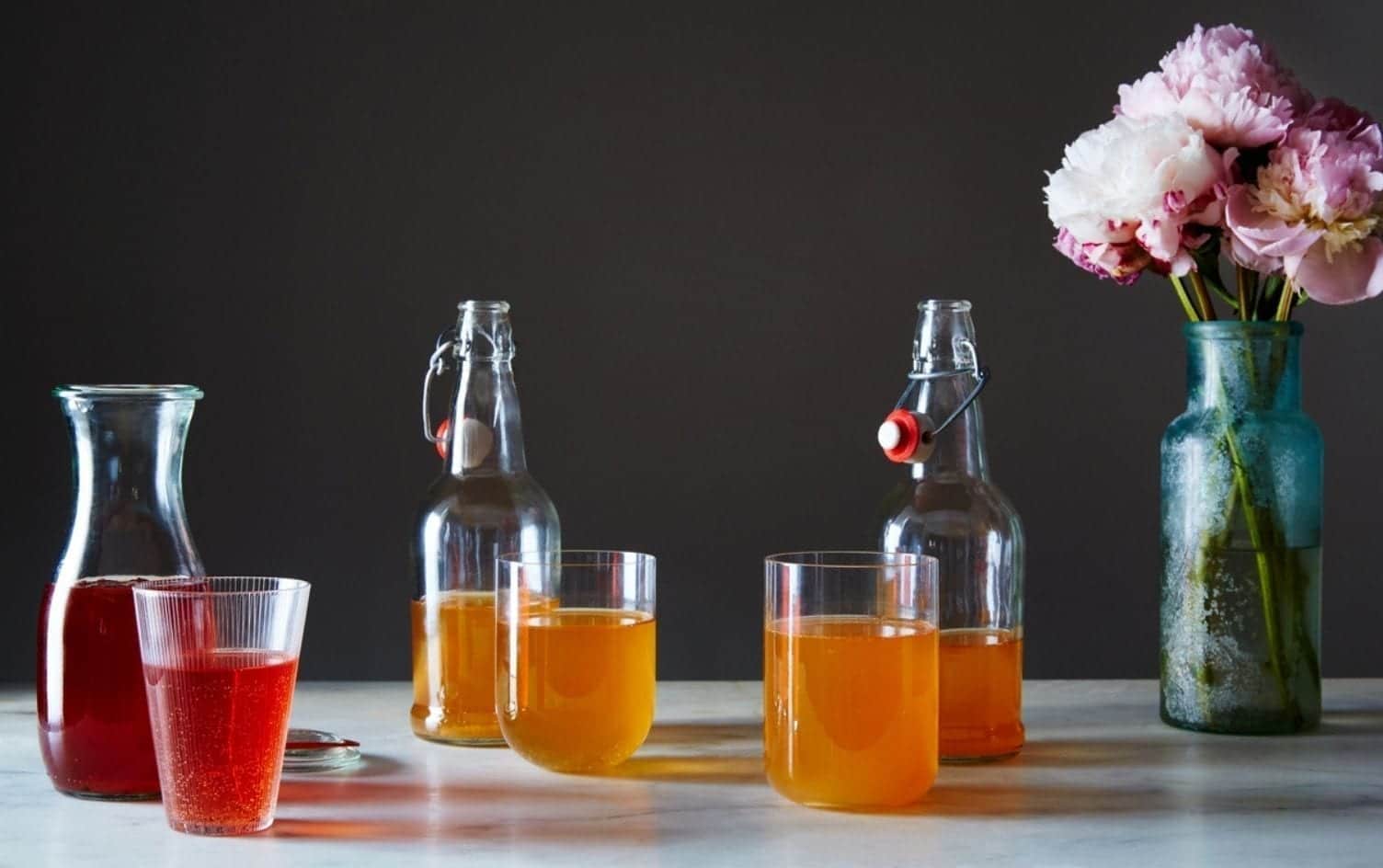You’ve likely heard of the popular gut-friendly drink, kombucha. Now there’s a new bubbly beverage in the specialty drink aisle — prebiotic sodas — created to help promote gut health, and as a better-for-you alternative for folks looking to cut back on soda. They’re generally made with sparkling water, prebiotic ingredients (more on that later), fruit juice, sugar or Stevia and come in a variety of flavors.
HOW IS PREBIOTIC SODA DIFFERENT FROM KOMBUCHA?
Kombucha is a fizzy, fermented drink that contains probiotics — like yogurt, kefir and sauerkraut — which provide beneficial bacteria that support gastrointestinal health. Whereas prebiotics are food for probiotics. They’re also good for your GI system, but they “do it by feeding the good bacteria in the gut,” explains Mia Syn, MS, RDN. To have a balanced gut, you need both, which is why drinking kombucha and prebiotic sodas can be beneficial. “Research shows a healthy gut supports immune health and digestion,” says Syn.
Prebiotics are a type of fiber, and they’re readily found in plant-based foods. Green bananas and artichokes are two good sources, says Syn. In soda form, you’ll find apple cider vinegar (which contains pectin, a fiber) in Poppi, OliPop contains “Olismart,” a mix of various inulins, which are prebiotic fibers. Health-Ade’s Booch Pop adds cranberry juice powder to provide prebiotics. You’ll also find many of these sodas are sweetened with a combination of sugar or the sugar substitute Stevia. The roots of the Stevia plant also contain inulin and fructans, so you may get a dose of sweetness with a side of prebiotics, too, according to a study in the journal Advances in Nutrition.
Unlike probiotics in kombucha, which must be alive to reap the benefits, prebiotics are not likely to lose their efficacy in a prebiotics beverage, notes Syn. This fact gives them a slight edge in supporting gut health.
IS PREBIOTIC SODA BETTER THAN REGULAR SODA?
“These prebiotics sodas tend to be developed with health in mind, and so they are lower in added sugar,” says Syn. For example, a regular can of Coke has 140 calories and 39 grams of sugar (more than the daily recommended 25g for women and 36g for men), all of which is added sugar in the form of high-fructose corn syrup, in addition to artificial flavors and coloring. On the other hand, a can of Strawberry Lemon Poppi prebiotics soda has 15 calories and 4 grams of added sugar, along with natural flavors (and no added colors).
Let’s face it, it’s not hard to be healthier than soda. In fact, people who drank two or more glasses of soft drinks per day had a 17% increased risk of dying from any cause compared to those who had less than one glass per day, according to a study on nearly a half-million people, published in JAMA Internal Medicine in 2019. “While both traditional soda and prebiotics soda contain added sugar, which you want to avoid in excess, prebiotics provide some benefit while standard sodas provide empty calories and no nutrition,” says Syn.
ARE THERE ANY DOWNSIDES?
Because some of these prebiotic sodas use Stevia as a sweetener to keep added sugar and calories low, some people find they cause digestive issues. If Stevia has that effect on you, read the label before buying a can. Artificial sweeteners like Stevia could also increase tolerance to sweetness, causing some people to crave sweet foods.
Health-Ade Booch Pop uses cane sugar and fruit juice only, but because of that, it contains more calories (40 in its Lemon + Lime flavor) and sugar (9 grams of added sugar) compared to the brands using Stevia.
THE BOTTOM LINE
Overall, it’s important to have a well-rounded diet that places an emphasis on whole foods and minimizes added sugar and no-calorie sweeteners. If you’re eating a variety of plant-based and fermented foods, you’re likely getting both probiotics and prebiotics and don’t necessarily need to drink these specialty beverages, says Syn.
However, while it’s always a good idea to drink more water, prebiotic sodas can still be part of a healthy diet, especially if they help you cut back on traditional soda. They can still aid hydration and support gut health. If Stevia upsets your stomach, make sure to try a soda that doesn’t contain the sweetener and be mindful of your daily added sugar intake, which you can track in an app like MyFitnessPal.
Unlock an experience that’s like having a dietitian, trainer and coach — right at your fingertips. Go Premium for expert guidance and exclusive tools that will help you reach your personal health goals.




